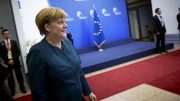Short of wartime and economic depression, it is hard to imagine a New Year arriving amid as much trepidation as this New Year.
The year just ending brought us the shocks of Brexit and Trump and the horrors of Aleppo in Syria and terrorism. But the aftershocks that are to come in 2017 will be at the very least disruptive and unsettling and, at worst, possibly earth-shattering.
It is said that the big upheavals of 2016 changed the world. In 2017 we will begin to find out just what that means.
What is especially problematic about the year ahead is that so much is unknown and unpredictable about the consequences of Donald Trump’s presidency and Britain’s departure from the European Union (EU).
While there is a relentless inevitability about violence and bloodshed in the Middle East and more terrorist attacks against the West, the course that events will take in Europe and the US – and across the western democratic world – is utterly unpredictable.
The rise of the populist right which carried Brexit and Trump to astonishing victories in 2016 appears likely to gather momentum in 2017. Whether the momentum will be sufficient to lead to similarly astonishing victories for Marine Le Pen in France and other far-right, anti-establishment forces elsewhere is hard to say.
But, if it does, then we are looking at the consolidation in 2017 of a changed world order that will see the end of the post-World War II liberal social and economic enlightenment that has been so important to peace and stability in Europe and to rising living standards around the world.
For European business and economic decision makers, the prospect of uncertainty and disruption must be alarming.
In 2016, there were the first real signs that the European economy was beginning to emerge from the long malaise that followed the global financial crisis. In more normal times, Europe could look forward to 2017 being the best year of the post-GFC decade.
Economic growth may still gather pace in 2017 but political and social upheaval could quickly squash consumer and business confidence and, therefore, the chances of a European revival.
In more normal times, Europeans could look to the year ahead more optimistically because of the lead that was being offered by the United States. The US economy has been steadily heading in the right direction for some time, to the point where the US Federal Reserve increased interest rates in December for the first time since the GFC.
But the Trump presidency raises big questions about where the US goes in 2017.
Financial markets are betting on increased growth as Trump implements his promise to cut taxes to accelerate growth as part of his plan to “make America great again”.
However, the markets are also closing their eyes to a lot of other things that Trump is proposing to do, particularly his promises about killing trade deals and his threats to go to economic war with China.
An eruption of dangerous geo-political tensions and tit-for-tat economic and trade recriminations is a major risk for the world economy in the months ahead. But all this may be nothing compared to the deeper undercurrents of uncertainty that the events of 2016 set in motion.
What the big political shocks of Brexit and Trump revealed – which had already been apparent on a smaller scale in countries where anti-establishment, anti-elite and anti-fact forces had already emerged and gained political power – was that popular support was crumbling for the western democratic economically liberal philosophy and the institutions that it created and which provided the foundations for the post-World War II order.
Across the developed world, people are losing faith in free market economic rationalism. Or, more correctly, they are increasingly feeling angry about being left behind by the outcomes it has produced – soaring wealth for a few at the top and stagnating and even declining incomes for the vast majority of ordinary workers.
With Donald Trump appointing an administration that is bringing together America’s richest uber-capitalists, it seems extremely unlikely that his will be a reforming or redistributional presidency.
So the disillusioned masses that put Trump into power will become angrier and are quite likely to quickly turn against him. Unless he can manufacture something that goes beyond economics to hold his constituency together – a war, perhaps – then the prospect of an utterly dysfunctional America becomes a real and alarming one.
There are many already looking at the prospects for 2017 and turning to Europe as the defender of the post-war order.
Europe’s post-war era of peace and progress and its leadership on social and cultural inclusion and tolerance are seen as under threat from the rise of the populist right. With no prospect of Trump’s presidency resisting the erosion of these advances, some see Europeans as holding the key to preventing the most dramatic reversal of human progress since the Enlightenment in the 18th century.
What they want is a Europe which responds to the fears of ordinary people that have been forgotten by the elites and which, at the same time, defends the progress that has been made in advancing the rights of long-disadvantaged minorities.
But, with all the problems it already faces just holding the European Union together, as well as dealing with immediate crises such as the mass movement of refugees, the Brexit aftermath, the threat of a wider revolt against the Union, the Greek bailout, the Italian banks, the tensions with Russia and so on, Europe is in poor shape to be attempting to lead the world.
All this considered, it requires a huge leap of faith to believe that things will turn out well in 2017.
By Geoff Kitney





